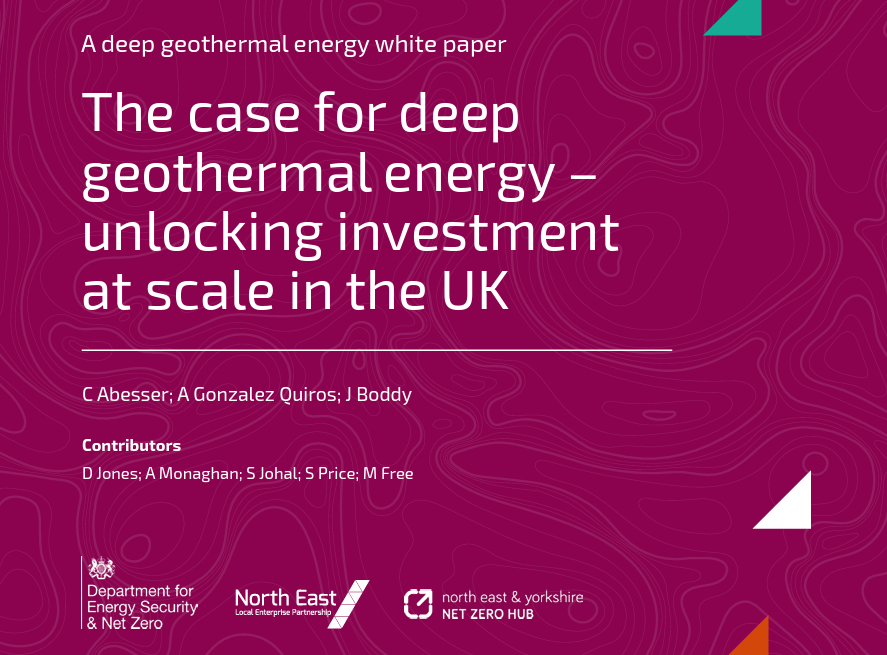
The document aims to provide an evidence-based assessment to help accelerate the development and deployment of deep geothermal energy projects in the UK.
Deep sedimentary basins dispersed all across the UK offer most of the onshore deep geothermal potential. Temperatures in these regions are estimated to be 40 to 60 degrees Celsius, also these could also reach up to 100 degrees Celsius at greater depths. Granites found in Cornwall, the North of England, Scotland, and Northern Ireland also provide potential targets for power and/or heat production.
Benefits of deep geothermal
The primary incentive for developing geothermal in the UK is that it greatly contributes to the Net Zero goals by potentially delivering savings of between 2,400 to 14,000 tonnes of equivalent CO2 emissions per year. This is particularly applicable to the public sector as one of the main emitters of greenhouse gases in the UK.
A well-developed geothermal sector can provide an energy supply to the UK with little reliance on external factors like supply chains and geopolitics. It can provide heat and/or power independent of the weather and will help the UK diversify its renewable energy sources.
Deep geothermal projects also provide economics benefits in terms of jobs and opportunities for oil and gas workers to transition to renewable energy. The Eden Geothermal Project in Cornwall has provided around 254 Full-Time Equivalent jobs through the various stages of its development. With 32 deep geothermal projects in the UK at different stages of development, this industry can create over 1,000 direct jobs and 2,500 indirect jobs in the short-term.
A previous report prepared by MP Kieran Mullan finds that many potential geothermal sites happen to coincide with areas of low economic resilience. Developing geothermal in these areas presents opportunities in addressing both energy poverty and economic uplift. Moreover, using geothermal energy for heating spas and swimming pools has been shown to improve quality of life in many countries.
The UK is uniquely positioned for geothermal development because of the its high number of onshore wells that had previously drilled for oil and gas or similar purposes. Re-using abandoned hydrocarbon wells for geothermal has been pursued by research institutes and private developers in the UK, potentially building geothermal capacity while avoiding the high capital costs associated with drilling.
Constraints to deep geothermal development in the UK
The paper cites the lack of technology awareness as one of the primary challenges for the development of deep geothermal. This applies both to policymakers and potential end-users or clients. The lack of any targets for developing deep geothermal technologies as part of the UK’s decarbonization efforts is considered by many stakeholders to be a key barrier to the deployment of deep geothermal.
Stakeholders mentioned that it remains very difficult to get funding for geothermal projects due to the limited availability of financial support mechanisms. This is a topic that has come up in interviews we have done with Eden Geothermal and Geothermal Engineering Ltd. (GEL). Overall, stakeholders consider the support given to geothermal projects as poorer compared to other renewable technologies such as solar, wind, and hydrogen.
There is currently no dedicated government support available for deep geothermal heat projects in the UK. The only existing mechanism for supporting low-carbon power generation is the Contracts for Difference (CfD), of which geothermal is still at a disadvantage when bidding against more developed technologies.
Other barriers cited in the report include the lack of an accessible database for data useful for geothermal development such as subsurface geological information and legacy well data, the lack of a coordinating body for geothermal licensing applications, and an insufficient supply of specialist equipment and skills for geothermal projects.
Recommendations
The paper makes six recommendations to support the development of a geothermal sector in the UK. Recommendations were made based on the short-term, medium-term, and long-term framework with the assumption that the geothermal industry is only in its nascent stage where technology visibility and investor confidence are still low.
Undertake a review of financial support for geothermal energy
Clearly outline the role of geothermal energy in the UK’s Net Zero efforts
Improve data availability and accessibility
Review the legal status, regulation, and licensing of geothermal energy
Develop and understanding of the public perception of geothermal energy
Support communication between stakeholder groups